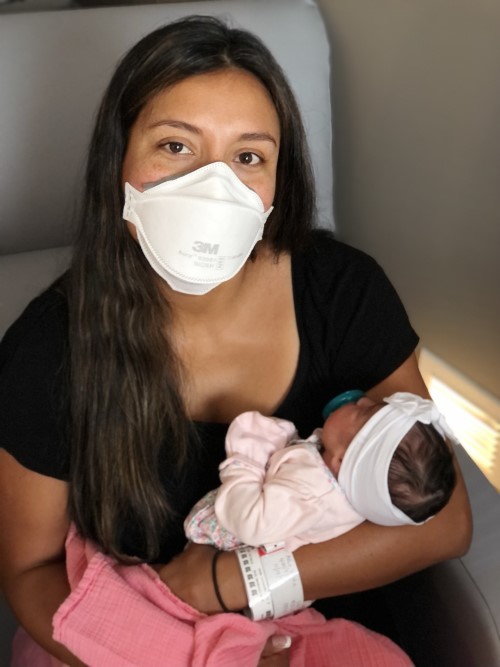
Special to Iredell Free News
When Valerie Allen learned she was pregnant with her fourth child, she knew it would be her last pregnancy. The 29-year-old Statesville resident was already a mother to three thriving children, and she and her husband looked forward to completing their family.
Allen had plans for this birth, just has she had for her other children. She knew what to expect, and was even anticipating being induced, which had happened with all three of her previous pregnancies. She had no reason to expect anything would be any different than it had before.
Just one week before her induction date, though, those plans started to shift. On August 3, Allen tested positive for COVID-19. So did her husband Jacob and her children, ages 11, 7 and 1, and her parents. While everyone else had mild symptoms, Allen’s were more concerning.
“My first symptom was body aches, and then I had a fever, and then really bad fatigue, a sore throat, a cough, and a stuffy nose,” she said, adding that as soon as she started not feeling well she and her family were immediately tested.
Getting a positive result was nothing short of frightening.
“I was freaking out. I was so scared because I knew that I was supposed to be induced on that Tuesday coming up, and I was terrified because I knew I was going to have a brand new baby and I didn’t want her to get COVID,” she said.
Allen’s newborn daughter didn’t want to wait for her induction date though, and she went into labor on her own on Sunday, August 8, while still under COVID isolation.
Although the delivery experience was different than what she had hoped for given various COVID precautions, all went well.
“There was a lot going on, and I was sick, but I was okay when I gave birth,” she said.
Allen was discharged from the hospital with her newborn a few days later, but it wasn’t the type of homecoming she wanted.
“Taking care of a newborn while you have COVID is hard. We all had to wear our masks, and before we touched her we made sure we washed our hands really well. I only touched her when I needed to feed her and change her,” she said. “That was really, really hard because all you want to do is snuggle your newborn baby and I couldn’t because I had COVID. I couldn’t even give my daughter a kiss when she was born. It was traumatizing.”
But things were about to get a lot harder.
After Allen returned home from giving birth, her COVID symptoms started to worsen.
“That’s when I started getting really sick. I couldn’t even hold a conversation because I was falling asleep. I tried to take a shower and I couldn’t stand up. My fever was going up and down. I wasn’t eating. I was like a mummy, basically,” she said.
Worried, her husband insisted she return to the hospital.

Since Allen was breastfeeding, staff at Iredell Memorial Hospital allowed her newborn, as well as her husband, to be in the Emergency Department with her while she was being evaluated. She was soon diagnosed with COVID pneumonia in both lungs and was admitted to the Critical Care Unit (CCU). For safety reasons, her daughter could not accompany her there.
An advocate for breastfeeding, Allen was adamant she continue even while in dire straits.
“I had to pump and my husband would come get the milk,” she said.
That didn’t last long though. The oxygen she was on wasn’t enough, and her family and medical team were desperate to help Allen get better. But that would require medications that wouldn’t be safe for her pass on to her newborn in her breastmilk.
“I started yelling, I was fighting with my family because I wanted to breastfeed,” she said.
It was an argument she had with a nurse that finally convinced her to accept the recommended treatment plan.
“The nurse told me ‘Do you realize how sick you are? You’re about to be on a ventilator,’ ” she said. “I thought ‘I don’t want to die – I want to be here.’ ”
Being in the CCU, separated from her family, was extremely difficult for Allen.
“I saw people die out of my window when I was in CCU,” she said. “You don’t want to see that, knowing they have COVID and you have COVID too, and people are dying around you – it’s a lot to take in. When you’re lying there hopeless and so sick, and people around you are dying from the same thing, everything goes through your mind.”
She did start to improve though, and after about a week in the CCU, Allen was moved to a less critical unit of the hospital as she continued to recover. Eighteen days after first being admitted, she was finally able to go home – with oxygen that she was only able to stop using just recently, on September 6.
“That’s 18 days away from my newborn baby,” she said. “Talk about traumatizing when you’re going to the hospital and don’t know you’re going to be there for half a month.”
In fact, traumatizing is the word Allen would use to describe her entire ordeal with COVID-19.
“I was in the hospital and I just felt like everything was being taken from me, and I was traumatized. Giving birth to your baby and not being able to kiss them, and not being able to see them because you have to be in the hospital with COVID and pneumonia – it was so traumatizing. Everything I’ve been through is traumatizing. I would never want someone to go through what I went through.”
Her family was also impacted by her hospitalization.
“My daughters didn’t realize how sick I was — they just knew ‘Mom’s in the hospital, she’s not doing well.’ My 11-year-old understood more, but obviously every time I FaceTimed them we would all cry. I wanted to be home with my kids and they wanted mommy home – it was hard,” she said. “My poor son, who is 1, is so distraught – he’s terrified I’m going to leave again.”
And she can no longer breastfeed.
“My daughter is on formula now – and I know breastfed is best – but this is my last baby, and I hold it dear to my heart and it was really hard for me to give that up.”
Allen still has pneumonia in her lungs, and has been told it will take months to recover.
She still needs a plethora of medications, and breathing treatments, and still suffers from fatigue.She also has to work to regain her physical strength after being bedridden for so long.
Allen has seen X-rays of her lungs and knows how bad they look. It worries her for the future.
“I’m worried that my lungs won’t recover, or that there will be symptoms in the future where something is wrong with my lungs or my heart or just my body,” she said. “And I’m terrified now that we’re going to get COVID again.”
Her entire family is being more cautious in their activities now too, while still trying to not live in fear, she said, adding that while they had all been careful throughout the pandemic, she knows they weren’t as careful as they could have been.
“We wore masks, but we really didn’t focus on avoiding certain places or social distancing,” she said, adding that has changed now, and they’ve added extra precautionary measures since school has started. Each day when her kids arrive home from school, Allen has them wash their hands and change their clothes.
“You don’t take it seriously until you go through it,” she said.
That’s not all that’s changed, either. When Allen and her family contracted COVID, only her parents had been fully vaccinated, and her husband had just received his first dose of the COVID-19 vaccine. Allen was not vaccinated at the time, and her children are not old enough yet to be eligible to be vaccinated.
Now, Allen biding her time, anxiously awaiting clearance from her physician to be vaccinated herself.
“I am definitely going to get vaccinated,” she said. “I’m hoping that if I get COVID again I won’t get it as bad as I did this time.”
She hasn’t always felt that way, though. Initially, Allen admits, she had no intention of getting the vaccine. She was especially nervous about being vaccinated while pregnant.
“I totally regret it now because of what I went through, but you live and you learn,” she said. “That’s why I want to get my story out there – hopefully it will help somebody.”
She also has a message for others: “Shut out all the media and do your research and really look into the vaccine. Really decide what is best for your family. Really look at the information because you never know what’s going to happen and how it’s going to affect you,” she said.
That goes for those who are pregnant or hoping to be pregnant soon, too.
“Talk to your OB,” Allen said, adding that vaccination during pregnancy also has the added benefit of passing antibodies to your newborn child. “Before I had COVID, I didn’t want to get vaccinated, and now I’m like ‘Yes, everyone please get vaccinated because you never know what’s going to happen. You’d rather be safe than sorry.”
“I had no underlying conditions,” she said. “I’m a healthy person, and I can’t believe how bad it got me.”
As she reflected on her experiences, Allen also praised her husband for his unwavering support, noting that her hospitalization was the longest the two have ever been apart from each other.
“If it wasn’t for my husband being concerned and taking me to the hospital, who knows what would have happened if I waited any longer. He was so scared. He thought I was going to die. This whole thing really opened our eyes, and we look at life so differently now. We really do,” she said. “He took on a brand new baby, three other kids, he’s going to school, he’s working. He’s a saint. I don’t know how he did it, but he did. I love him so much for it, even more. He’s my rock.”
About Iredell Health System
Iredell Health System includes Iredell Memorial Hospital; Iredell Mooresville; Iredell Home Health; Iredell Wound Care & Hyperbaric Center; Community and Corporate Wellness; Occupational Medicine; the Iredell Physician Network and more. Iredell Memorial Hospital is the largest and only nonprofit hospital in Iredell County. The comprehensive healthcare facility has 247 beds; more than 1,700 employees; and has 260 physicians representing various specialties. Centers of excellence include Women’s and Children’s; Cardiovascular; Cancer; Surgical Services and Wellness & Prevention. The Health System’s newest campus, Iredell Mooresville, is home to the area’s only 24-hour urgent care facility, as well as an ambulatory surgery center, imaging center, rehabilitation services, and physician practices. The mission of Iredell Health System is to inspire wellbeing. For a comprehensive list of services and programs, visit www.iredellhealth.org.



